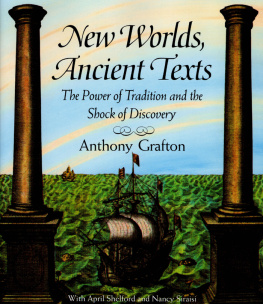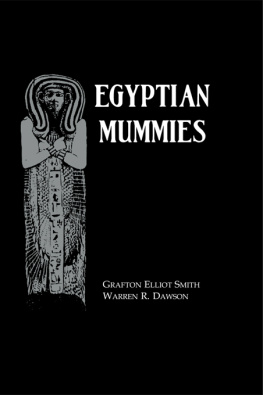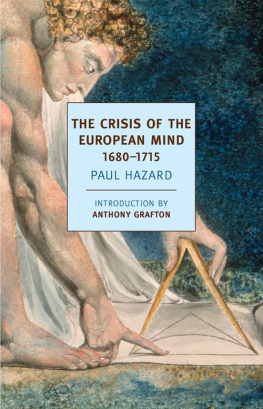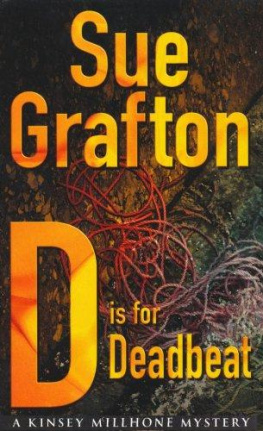Anthony Grafton - Information: A Historical Companion
Here you can read online Anthony Grafton - Information: A Historical Companion full text of the book (entire story) in english for free. Download pdf and epub, get meaning, cover and reviews about this ebook. year: 2020, publisher: Princeton University Press, genre: Politics. Description of the work, (preface) as well as reviews are available. Best literature library LitArk.com created for fans of good reading and offers a wide selection of genres:
Romance novel
Science fiction
Adventure
Detective
Science
History
Home and family
Prose
Art
Politics
Computer
Non-fiction
Religion
Business
Children
Humor
Choose a favorite category and find really read worthwhile books. Enjoy immersion in the world of imagination, feel the emotions of the characters or learn something new for yourself, make an fascinating discovery.

- Book:Information: A Historical Companion
- Author:
- Publisher:Princeton University Press
- Genre:
- Year:2020
- Rating:4 / 5
- Favourites:Add to favourites
- Your mark:
- 80
- 1
- 2
- 3
- 4
- 5
Information: A Historical Companion: summary, description and annotation
We offer to read an annotation, description, summary or preface (depends on what the author of the book "Information: A Historical Companion" wrote himself). If you haven't found the necessary information about the book — write in the comments, we will try to find it.
Information: A Historical Companion — read online for free the complete book (whole text) full work
Below is the text of the book, divided by pages. System saving the place of the last page read, allows you to conveniently read the book "Information: A Historical Companion" online for free, without having to search again every time where you left off. Put a bookmark, and you can go to the page where you finished reading at any time.
Font size:
Interval:
Bookmark:
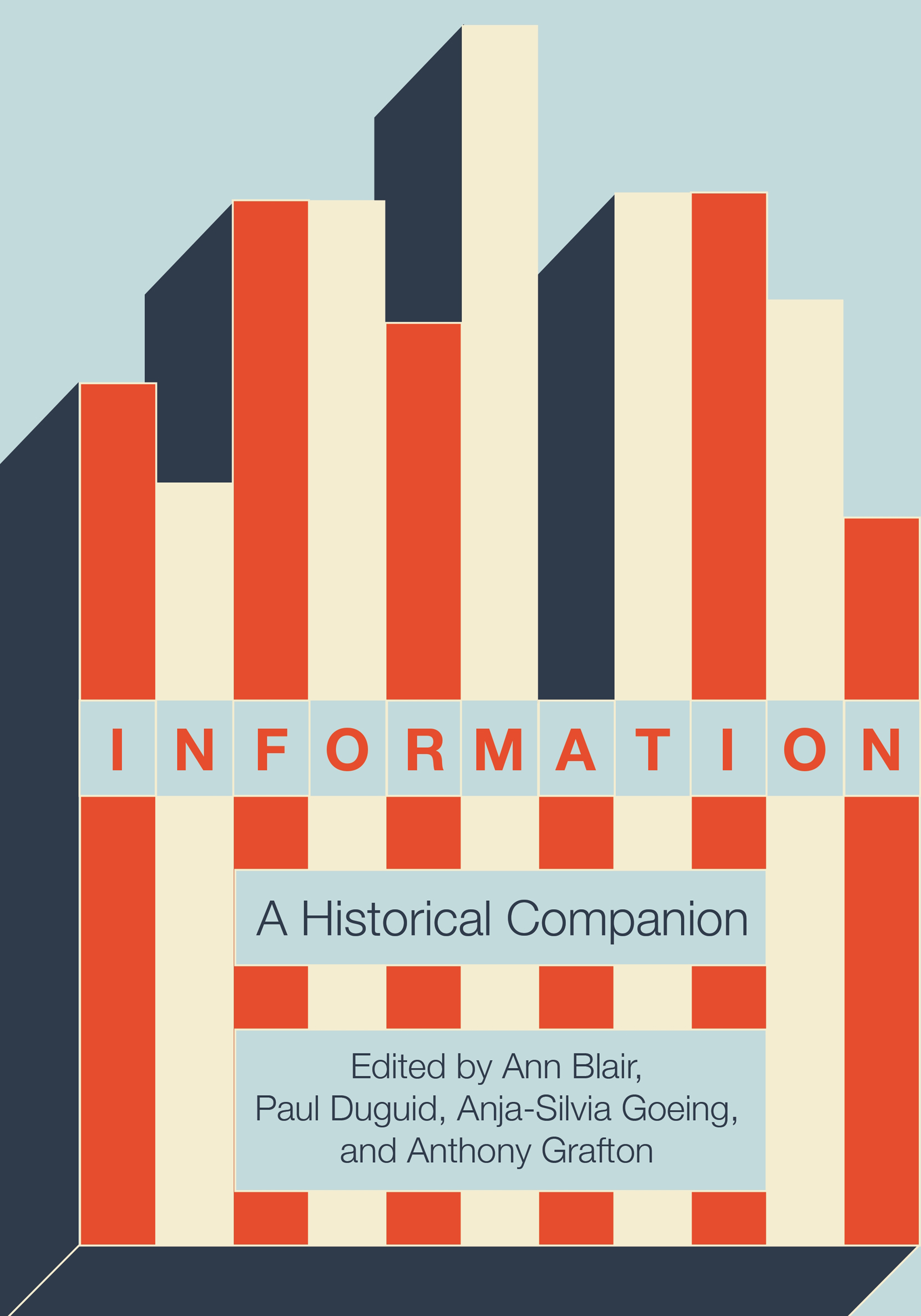
INFORMATION
INFORMATION
A HISTORICAL COMPANION
Edited by Ann Blair, Paul Duguid, Anja-Silvia Goeing, and Anthony Grafton
PRINCETON UNIVERSITY PRESS
PRINCETON AND OXFORD
Copyright 2021 by Princeton University Press
Requests for permission to reproduce material from this work should be sent to
Published by Princeton University Press
41 William Street, Princeton, New Jersey 08540
6 Oxford Street, Woodstock, Oxfordshire OX20 1TR
press.princeton.edu
All Rights Reserved
Library of Congress Cataloging-in-Publication Data
Names: Blair, Ann, 1961 editor. | Duguid, Paul, 1954 editor. | Goeing, Anja-Silvia, editor. | Grafton, Anthony, editor.
Title: Information : a historical companion / edited by Ann Blair, Paul Duguid, Anja-Silvia Goeing, and Anthony Grafton.
Other titles: Information (Blair, Duguid, Goeing, Grafton)
Description: Princeton : Princeton University Press, [2021] | Includes bibliographical references and index.
Identifiers: LCCN 2020025889 (print) | LCCN 2020025890 (ebook) | ISBN 9780691179544 (hardback) | ISBN 9780691209746 (ebook)
Subjects: LCSH: Information scienceHistory. | Information resourcesHistory | Information scienceEncyclopedias.
Classification: LCC Z665 .I57815 2021 (print) | LCC Z665 (ebook) | DDC 020.9dc23
LC record available at https://lccn.loc.gov/2020025889
LC ebook record available at https://lccn.loc.gov/2020025890
Version 1.0
British Library Cataloging-in-Publication Data is available
Editorial: Anne Savarese and Jenny Tan
Production Editorial: Natalie Baan and Karen L. Carter
Text Design: Carmina Alvarez
Jacket Design: Layla Mac Rory
Production: Erin Suydam
Publicity: Kate Hensley, Jodi Price, and Amy Stewart
Copyeditor: Kathleen Kageff
- vii
- xiii
- xv
- xvii
- 3
- 21
- 38
- 61
- 86
- 104
- 128
- 152
- 174
- 190
- 211
- 238
- 259
- 287
- 833
- 841
Information: A Historical Companion explores how information has shaped and been shaped by human society across ages past and present. It offers readers views of history through the lens of information and views of information through the lens of history.
Such a project might seem paradoxical. In 1964, the media scholar Marshall McLuhan declared his the age of information. The idea was widely taken up, so that in the following decade an IBM advertisement could announce, Information: theres growing agreement that its the name of the age we live in. Both announcements thrust information to the fore but in the process suggested that it and related information technologies of the sort IBM made had created a fundamental break from the past. History, by these and similar accounts, can seem retrograde, irrelevant to forward-looking information. This book is built on the belief that, contrary to IBMs assertion, growing agreement might reasonably be claimed to point another way. Since the 1970s, books, conferences, and university courses have shown increasing interest in information in prior ages. In the process, a growing body of information-focused research has thrown new light on both the past and the present, drawing the two together rather than separating them. Indeed, as this book goes to press, two other significant collections, Information Keywords and Literary Information in China: A History, are also coming into print. Together those volumes and this one reveal the remarkable range of approaches to and topics in information history that are raising interest and enthusiasm within academia and beyond.
For its part, this book assembles researchers who have engaged directly with information in historical context to illustrate for scholars and general readers alike the breadth and the depth of these developing perspectives. The contributors look at the emergence across history of new information practices, technologies, and institutions as these developed to address informational challenges of their day. In particular, they look at moments of confrontation and transitionbeginning, for example, with Columbuss legendary encounter with Caribbean societies in 1492to reveal how approaching these as part of a history of information provides fresh insight into how they unfolded at the time and how they might be better understood today. From this starting point, the thirteen long articles in examine in depth particular topics that are critical to such an exploration. Together, contributors to Information: A Historical Companion show how information and information technology were crucial to earlier ages, as they are to our age today.
Information, of course, is an expansive term. Consequently, any starting point for an investigation can seem arbitrary, and convincing arguments can always be made for starting elsewhere. But given inevitable constraints of space and time in a publishing venture such as this, the editors have chosen to focus principally on the *early modern and modern periods, from circa 1450 to the present. Nonetheless the early articles and many of the entries look back well before this to allow the overall collection to develop a continuous, information-focused narrative across many historical contexts down to the present in the scope of a single volume and with sufficient depth to reveal emergent and enduring themes. Within this constraint of continuity, the editors sought entries that engaged diverse issues and places and took distinct approaches to the topic of information. The attempt to achieve both continuity and diversity makes no claim to comprehensiveness. While it is hoped that this selection will appear judicious, all contributors, as well as the editors, are aware of inevitable gaps. They hope that the collection as a whole can indicate how topics omitted might nonetheless be illuminated by the overall information perspectives of the collection. Together, the articles reveal recurring responses to social change, thereby making evident over time and across cultures the resilience of attitudes familiar today, such as information optimism and information anxiety or faith in information solutions and surprise at their unintended consequences.
The opening account of Columbus and the Silk Road introduces globalization as one of the volumes major themes, represented by emerging networks of travel and communication across Asia, the Islamic world, and Europe. Informational connections inevitably shaped this road as not only silk and spices but also word of supply and demand and technologies such as paper and forms of writing and mathematics passed back and forth, opening new worlds, both literally and metaphorically, to recipients. These exchanges also fostered spiritual and scientific engagements, as intrepid Buddhists, Muslims, and Christians traveled in opposite directions along these interconnecting pathways, appearing in new environments and before new audiences, then sending back reports of such encounters. Supporting this circulation, the Silk Road and similar communication channels emerge as complex sets of social, institutional, and geographical networks, continuously circumscribed by short- and long-distance demands of and for information. In response to these demands, practices from printing to record keeping developed to formalize and reify information in different ways, and new communication channels able to carry such reifications arose, including crucially important forms of postal networks.
Font size:
Interval:
Bookmark:
Similar books «Information: A Historical Companion»
Look at similar books to Information: A Historical Companion. We have selected literature similar in name and meaning in the hope of providing readers with more options to find new, interesting, not yet read works.
Discussion, reviews of the book Information: A Historical Companion and just readers' own opinions. Leave your comments, write what you think about the work, its meaning or the main characters. Specify what exactly you liked and what you didn't like, and why you think so.

